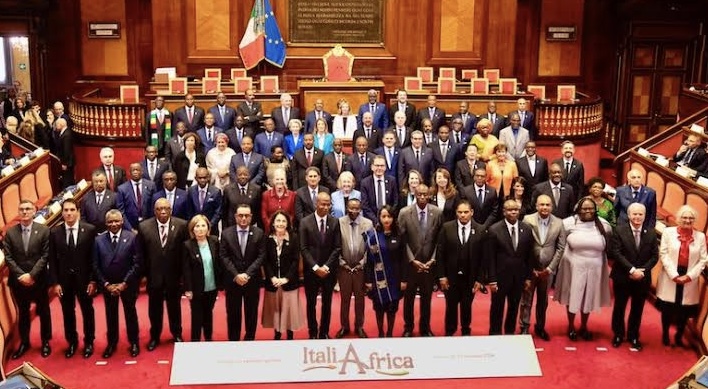Italy’s ambitious proposal to become a bridge for energy between Africa and Europe has met with skepticism from the African Union (AU), which questioned the feasibility and sincerity of the initiative.
At a one-day summit in Rome this week, Italian Prime Minister Giorgia Meloni unveiled the “Mattei Plan for Africa”, named after the founder of Italian energy giant ENI, Enrico Mattei. The plan aims to help African countries produce enough energy for their own needs and export the surplus to Europe, while also addressing the challenges of migration and climate change.
Meloni announced an initial pledge of $5.95 billion, including guarantees, and various projects to boost economic ties and create an energy hub for Europe. The summit was attended by 25 African leaders and European Union officials.
However, the AU chairperson Moussa Faki Mahamat expressed doubts about the plan, saying that Africa had not been consulted and that it had heard similar promises before that were not fulfilled.
“You will understand that we cannot be satisfied with promises that are often not kept,” he said in his address at the summit.
He also stressed that Africa did not want to be seen as a beggar or a passive recipient of aid, but as an equal partner that could offer its solutions and resources.
“Our ambition is higher. We advocate for a paradigm shift, for a new model of partnership that charts the path towards a fairer world and therefore, more relevant to building peace and prosperity through bridges of friendship and not barriers of security, perceived as barriers of hostility,” he said.
Meloni defended her plan, saying that it was consistent with the AU’s strategic framework, Agenda 2063 and that it would benefit both continents.
She said that Italy had the potential to become the natural energy supply hub for the whole of Europe and that it wanted to support African nations that were interested in developing renewable energy sources, such as solar, wind, and biofuels.
She cited examples of projects in this area, such as the one in Kenya dedicated to developing the biofuels supply chain, which aims to involve up to around 400,000 farmers by 2027.
She also mentioned the infrastructure projects that would connect the two continents, such as the ELMED electricity interconnection between Italy and Tunisia, and the new H2 South Corridor to transport hydrogen from North Africa to central Europe, passing through Italy.
The plan was welcomed by some African leaders, such as Kenya’s President William Ruto, who said that it would facilitate the decarbonization of the world and ensure a smooth and sustainable energy transition.
The African Development Bank Group President Dr Akinwumi Adesina also commended the Italian government for the Rome Process Financing Facility, which will provide around $108 million (90% of which is concessional financing) towards support for infrastructure in Africa, especially for renewable energy, energy efficiency, water and sanitation, agriculture and vocational training.
The summit was the first major event of Italy’s Group of Seven presidency, and it came amid a growing interest from European countries to strengthen their ties with Africa, as well as rising competition from other global players, such as China, Russia, and Turkey.
According to the International Energy Agency, Africa’s energy demand is expected to grow by 60% by 2040, while its population is projected to reach 2.5 billion by 2050. The continent has vast potential for renewable energy, but it also faces challenges such as lack of access, affordability, reliability, and efficiency.
The success of Italy’s plan will depend on how well it can address these challenges and meet the expectations and aspirations of African countries and people, who are looking for more than just promises.
Source: ESI Africa



